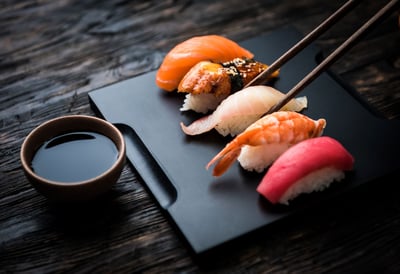 The Sacramento area is home to a small chain of sushi restaurants called Mikuni. The downtown location is a favorite of politicians and lobbyists. When they opened up the newest location in Roseville, they gave it a new name, "Mikuni Kaizen." They explained, "The Japanese word "kaizen," which translates to "continuous improvement," truly reflects the concept behind this Mikuni location. While the menu features a host of exquisite sushi rolls made popular at the restaurant's other locations, it is also highlighted by an extensive selection of small plates and tapas-style dishes- each more exciting and compelling than the next."
The Sacramento area is home to a small chain of sushi restaurants called Mikuni. The downtown location is a favorite of politicians and lobbyists. When they opened up the newest location in Roseville, they gave it a new name, "Mikuni Kaizen." They explained, "The Japanese word "kaizen," which translates to "continuous improvement," truly reflects the concept behind this Mikuni location. While the menu features a host of exquisite sushi rolls made popular at the restaurant's other locations, it is also highlighted by an extensive selection of small plates and tapas-style dishes- each more exciting and compelling than the next."
Of course, seeing this on a recent visit piqued my interest. It isn't common to find continuous improvement related terms out in the wild, so it stuck with me. It turns out that the idea of applying the principles of kaizen to sushi (or vice versa) is not as novel as I thought. A quick Google search revealed that there are lots of sushi restaurants with kaizen in the name.
In addition to Roseville's Mikuni Kaizen, you could enjoy:
- Kaizen Campbell in Campbell, CA
- Kaizen Sushi Bar & Grill in Ft. Lauderdale, FL
- Kaizen Sushi in San Francisco, CA
- Kaizen Tavern in Alexandria, VA
And those are just the ones that made the first page of Google.
Perfection and Simplicity
I'm sure he wasn't thinking about kaizen when he wrote this passage. Still, in his book Sushi Master: An Expert guide to sourcing, making, and enjoying sushi at home, Nick Sakagami explained the overlap of kaizen and sushi very well. He wrote, "Sushi represents a culture that strives toward perfectionism – one that sees mastery in the art of simplicity. Great purity follows from simplicity; hence, the finest sushi is simple in appearance. A passion for perfection drives the sushi chef to apply exacting standards of freshness and a perfect balance of flavors and textures."
It's no wonder that when thinking of a restaurant name that communicates the proprietor's desire to elevate their menu to the point of perfection, kaizen comes to mind.
Dreams of Sushi
It's impossible to do any online research into the philosophy of sushi without coming across references to the movie "Jiro Dreams of Sushi." The film features Jiro Ono, a three-star Michelin chef who is widely recognized as the most excellent sushi chef in the world. In fact, the Japanese government has recognized him as a living national treasure. (Our very own Mark Graban wrote about the movie back in 2014.)
The movie isn't really about sushi. It's really about how to be a master shokunin, how to become truly great as a master craftsman. Jiro himself explains it this way, "I do the same thing over and over, improving bit by bit. There is always a yearning to achieve more. I'll continue to climb, trying to reach the top, but no one knows where the top is." Could anything more clearly reflect kaizen?
Five Elements of Mastery
In the film, food critic Masuhiro Yamamoto speaks of what makes Jiro such a master. "He sets the standard for self-discipline," Yamamoto says. "He is always looking ahead. He's never satisfied with his work. He's always trying to find ways to make the sushi better or to improve his skills. Even now, that's what he thinks about all day, every day."
According to Yamamoto, five attributes are found in every great chef. I think it is safe to say that they are also found in people who thrive in a culture of continuous improvement.
- Majime (serious). A true master is serious about the art or work and committed to working hard.
- Kojoshin (improvement). The great ones always aspire to improve themselves and their work.
- Seiketsukan (cleanliness). While cleanliness is imperative in restaurants, ordered workspaces are also essential to quality work in any venue.
- Ganko (stubbornness). While stubbornness in business may not be seen as an attribute, it is required to stick with problems, even the toughest ones, until they are solved.
- Jyonetsu (passion). Passion is what separates the good from the great.
(Jiro Dreams of Sushi is available free with Amazon prime.)
After thinking about it this way, "Kaizen Sushi" makes a whole lot of sense. I'll end by answering my own question. Why is "Kaizen" such a popular name for sushi restaurants? Because it's perfect.




Add a Comment